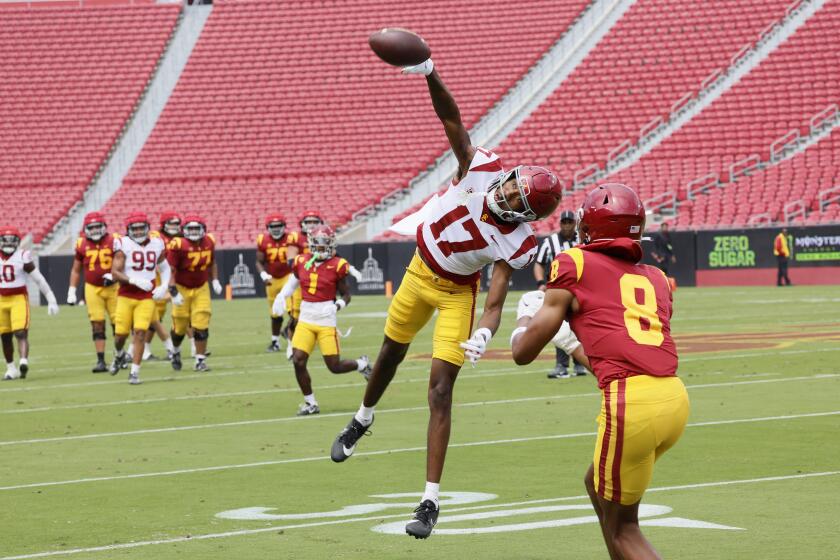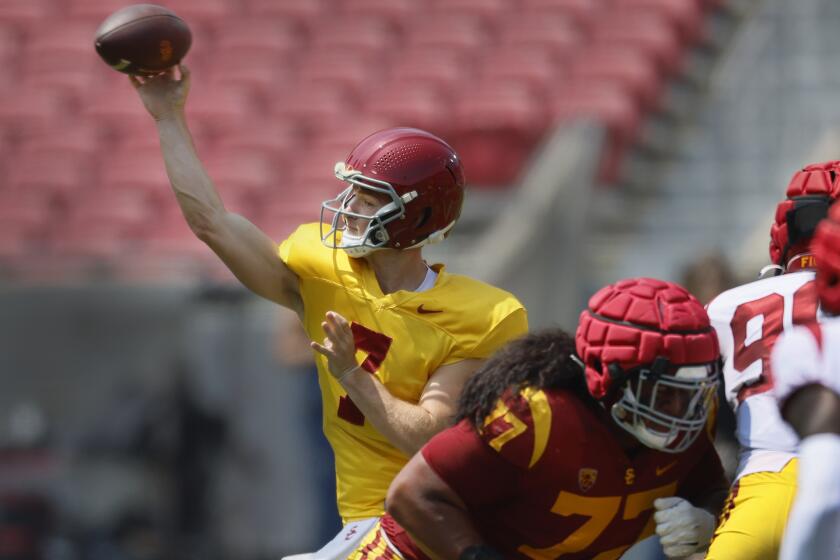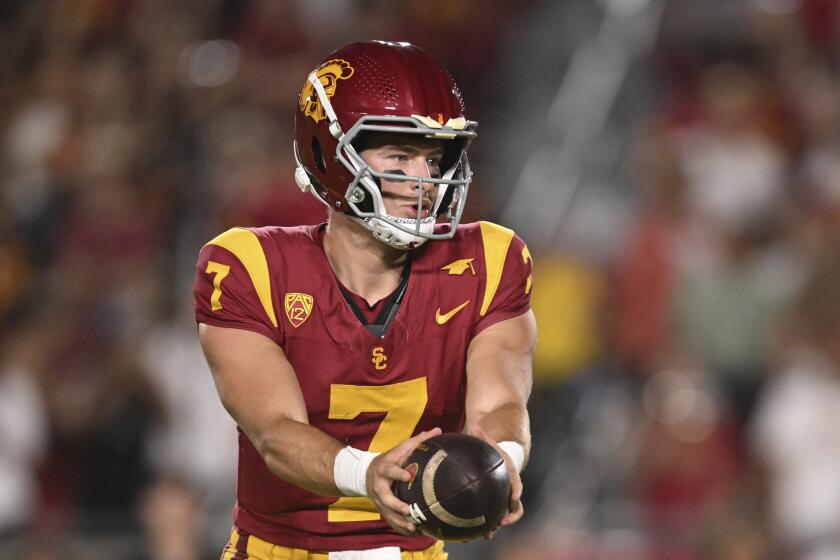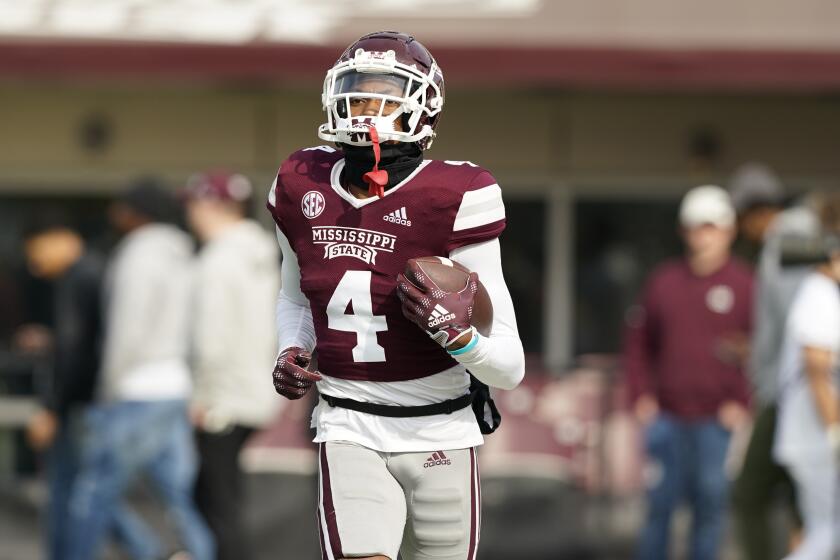Taking a pass on a basketball star
On the day Renardo Sidney announced his college choice, the gymnasium floor at Los Angeles Fairfax High was filled with 13 tables decorated in white linen with rose centerpieces, where more than 100 family members and friends dined on a catered meal of chicken and ribs.
“Back in the South, this is what we do,” Sidney’s mother, Patricia, said proudly. “We celebrate big.”
The Sidney family had left Mississippi for the Los Angeles area to further his basketball career, and the move had paid off.
It was Feb. 22, late in the high school basketball season, and Sidney was putting the wraps on a senior campaign in which he averaged 24.8 points and 11.2 rebounds and was the No. 2-rated power forward in the nation by Scout.com.
His college pick was about to surge as well. USC was gearing up a late-season run that would result in a third consecutive 20-win season, one it would cap with a Pacific 10 Conference tournament championship and a strong showing in the NCAA tournament.
Some thought the lavish affair -- the caterer estimated the total cost at about $2,000 -- was a bit over the top, but supporters didn’t care. “I think it’s warranted,” said one, Chris Rivers, an executive with the apparel company Reebok.
With plenty of theatrical flair, Sidney signaled his choice by dramatically opening a box that contained -- surprise! -- a USC baseball cap.
The family even took to flying a USC banner outside their rented home.
But a little more than two months later, the player is headed elsewhere.
USC, as UCLA had before, rescinded its scholarship offer, leaving one of the nation’s top talents temporarily without a team.
On Thursday, Sidney, 19, signed a letter of intent with Mississippi State days after visiting Starkville, Miss. The Bulldogs were, at best, his third choice -- but in the end, perhaps his only choice. When, after Sidney’s visit, a family spokesman was asked whether Mississippi State was the front-runner for his services, the reply came that the Bulldogs were “the only runner.”
A rare turn of events involving a 6-foot-10 prospect with a powerful build and uncommon shooting range for a big man.
“It’s highly unusual for both of those schools to abandon their recruitment of a player of that caliber and potential,” said George Raveling, a former college coach -- at USC and elsewhere -- who works the Southern California area for Nike. “They must know something the rest of us don’t know.”
UCLA and USC officials were prohibited by college rules from speaking publicly about Sidney while he was unsigned, and even now they have declined to do so. But sources on both campuses who have knowledge of his recruitment agreed to speak with The Times as long as their identities were kept anonymous.
Though they are from rival schools who often wage intense battles for the same athletes, the sources agreed on this about Sidney: The reward of suiting up such a prodigious talent was not worth the larger risk.
Bruins and Trojans sources both say they were wary of potentially intense NCAA scrutiny prompted by these issues: Despite what was perceived as a limited income, the family moved multiple times and resided in upscale homes during Sidney’s high school years; and stepfather Renardo Sr. directed a club basketball team with financial backing that was unclear beyond a relatively modest shoe company sponsorship.
Plus there was this: A source intimately familiar with Sidney’s recruitment said a university official thought the stepfather had strongly hinted that he expected to be compensated if his son signed with the school.
Renardo Sr. and Patricia, in person and through a spokesman, declined repeated requests to be interviewed for this story. But the family’s lawyer, Donald Jackson, said last week that there was never a request for payment, noting, “That would be a violation.”
Jackson, who is based in Montgomery, Ala., also said of the player, “There have been no violations of NCAA amateur regulations in this young man’s life.”
Details about the Sidney family’s finances were “irrelevant” and “no one’s business,” the lawyer said, adding, “It is not the place of the NCAA to question someone’s earning capacity or claim someone is living beyond their means.”
The questions remain unanswered, but they have upended a promising young athlete’s college career. And they will persist, even at Mississippi State.
On the day the Bulldogs received Sidney’s signed letter of intent, the athletic program’s compliance director, Bracky Brett, said the university would proceed with caution.
“We realize by simply signing him doesn’t mean the process is over,” Brett said. “We know there’s a lot of questions to be answered.”
He added, “Any issues related to his amateurism or extra benefits will be part of our discussions with all parties in the very near future. By all parties, I mean the prospect, his family, the NCAA, the Southeastern Conference and everyone here at Mississippi State.
“We’re not going to compromise the integrity of our institution. It’s going to be an interesting couple of weeks. Or months.”
Questions have surrounded the Sidneys since the summer of 2006, when the family moved to Southern California from Jackson, Miss. The player’s arrival here immediately raised eyebrows because basketball insiders knew the move was partially paid for and facilitated by shoe company executive Sonny Vaccaro.
Since then, the family has occupied at least three residences, and Sidney’s parents have chosen not to answer questions pertaining to their sources of income or the moves, which allowed their son to transfer to powerhouse Lakewood Artesia High School and then to a perennially strong team at Fairfax. Renardo Sr.’s employer is Reebok, and his wife is his personal assistant, according to Jackson.
A UCLA source said one of the school’s prime concerns was the family’s residence until September of last year: a home rented when Sidney transferred from Artesia to Fairfax that, according to public land records, is valued at $1.2 million. Located near Hancock Park, the home is owned by Sherman Oaks lawyer Leslie Klein, who said Patricia Sidney paid him by personal check what was “fair market value” -- between $4,000 and $5,000 a month. (More recently, the family rented another home up the street, the owner of which has not returned several telephone messages left by The Times.)
Before the family’s move from Mississippi, a former co-worker said Renardo Sr. was an assistant at a medical center, charged with such tasks as transporting patients by gurney. He was also “an assistant coach at a recreation center,” according to Vaccaro, who for years has been at the forefront of shoe company involvement with youth basketball’s best club teams and players.
Vaccaro, who at the time was working for Reebok, says he gave Renardo Sr. about $20,000 for the family’s move west, where Sidney first played for one of the most well-known and controversial club coaches in the nation, Pat Barrett, who guides a program called the Southern California All-Stars.
Barrett has coached top-level Southern California-based club teams for years, and his role as a middleman between players and college teams and the professional ranks has been a focus of several investigative media reports. Most recently, Yahoo Sports reported that Barrett received $250,000 from a New York sports agency in exchange for his help in securing former UCLA star Kevin Love as a client.
Speaking generally in an interview with The Times, Barrett said club coaches like himself worked as independent contractors and were paid by shoe companies via “sponsorship” or “consultant” contracts.
Sidney played for Barrett’s team one summer, then in 2007 became the cornerstone of the LA Dream Team, a new club coached by his stepfather. Asked why Sidney would leave his superior team for an upstart, Barrett said, “The dad wanted his own shoe deal.”
About the same time, Renardo Sr. and an El Monte car dealer named Richard Macias formed a nonprofit, tax-exempt educational organization called the Los Angeles/LA Dream Team Foundation.
Tax laws specify that charitable 501(c)(3) organizations such as the LA Dream Team “must not be organized or operated for the benefit of private interests, such as the creator or the creator’s family. . . . No part of the net earnings . . . may inure to the benefit of any private shareholder or individual.”
Forming a nonprofit to fund a youth athletic team isn’t a new strategy, according to Vaccaro, who said, “The money that comes in is supposed to fund and go to the betterment of the team, with that money obviously being focused on the team’s superstar.”
Federal law requires a nonprofit to allow public inspection of its application form and, if the organization has received more than $25,000 in donations in a given year, its federal Form 990. The Sidneys declined to respond to requests by The Times to inspect the LA Dream Team Foundation documents.
Online records also show the foundation has not filed an e-postcard, required by the Internal Revenue Service to be filed by November 2008 if a nonprofit raised less than $25,000 in 2007.
Without that documentation, it is unclear how much money the LA Dream Team Foundation raised, who donated to it, and how the money was spent.
Attorney Jackson shrugged off the issue, saying, “There’s no logical connection between a nonprofit and [Sidney’s athletic] eligibility.”
Vaccaro said he knew Renardo Sr. accepted at least another $20,000 in shoe money to play in a 2007 tournament in Las Vegas. Rivers, who took over when Vaccaro left Reebok, said he gave some financial support to the LA Dream Team, but would not divulge how much, saying, “That’s their personal business.”
Formerly a confidant of Renardo Sr. and a past colleague of Rivers, Vaccaro said he was not sure how the Sidneys were covering their expenses. Asked if the family could afford their current lifestyle on support from shoe companies alone, he quickly answered, “No.”
Spokeswoman Stacey Osburn said that although the NCAA had only loose guidelines for what club teams could receive from sponsors, rules were in place to discourage the use of nonprofits to funnel money directly to athletes. She added that any player receiving compensation from sources such as a sports agency or college booster would be subject to stiff penalties.
At both UCLA and USC, the final decision on Sidney was made at administrative levels above the head coach, sources at the schools said.
UCLA coaches thought that ending their recruitment of Sidney was a potentially colossal mistake, the sources added, but watching their counterparts at USC go for a roller-coaster ride eased the frustration.
Over just a couple of months, the Trojans thought themselves contenders, then not, then were surprised to learn they were back in the game. Late last year, USC thought it had little chance of landing Sidney -- until, a source said, Coach Tim Floyd was informed otherwise by a high-ranking Nike executive during the Trojans’ early January trip to Oregon to play the Ducks in Eugene.
Over the coming weeks, other sources confirmed that USC was, indeed, still in the running. But a university source said Floyd was uncomfortable enough that he sought the advice of his bosses before continuing with recruiting.
Then, in mid-February, with Sidney about to commit to UCLA, the Bruins reversed field and USC became the player’s school of choice.
It was at that point, on Feb. 18, that USC took the unusual step of inviting Sidney and his parents to meet not only with Floyd but with Athletic Director Mike Garrett and school legal counsel, sources in the athletic program said. Four days later came Sidney’s announcement to great fanfare that he would become a Trojan when the spring signing period came around.
Last week, a family source said Sidney learned he had cleared what was thought to be the final hurdle before he would officially sign with USC -- he posted a score on his Scholastic Aptitude Test that, combined with his grades in core classes, made him college-eligible. But within days, the same family source and others privy to information from the Trojans basketball program confirmed that the school and player had parted ways.
USC sources said administrators told the coaches to back off, as had happened at UCLA. And the source close to the Sidneys said the feeling was mutual given that “neither side wanted an impending investigation hanging over them.”
Duane Cooper, a former Trojans player who later worked for a sports agency and is now boys’ basketball coach at Compton Dominguez High, believes there could only be one reason for USC’s retreat.
“They must have a bad feeling,” he said. “Otherwise, why give up on a kid from your area who’s one of the top two or three players in the country?”
--
lance.pugmire@latimes.com
Times staff writer Eric Sondheimer and researchers Vicki Gallay and Robin Mayper contributed to this report.
Go beyond the scoreboard
Get the latest on L.A.'s teams in the daily Sports Report newsletter.
You may occasionally receive promotional content from the Los Angeles Times.




